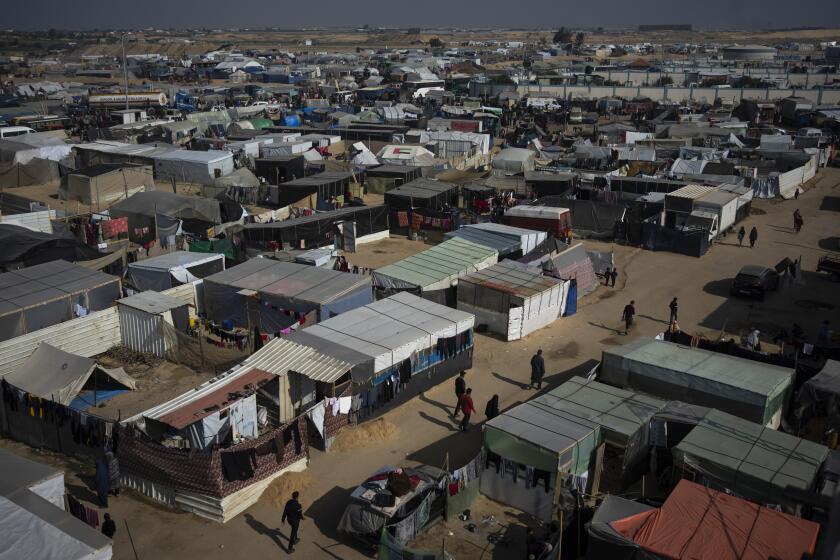NEWS ANALYSIS : Serbs’ Firm Stand May Push NATO Into Crisis
The United States and its European allies are rapidly approaching a critical juncture in their high-powered air campaign over Bosnia: how to proceed if Bosnian Serb Gen. Ratko Mladic continues to defy allied demands even after punishing bombing raids.
Despite 3,000 North Atlantic Treaty Organization air sorties, assaults by 13 Tomahawk missiles and thousands of artillery rounds, the Bosnian Serbs still have not complied with allied demands that they remove their heavy weapons from the 12 1/2-mile exclusion zone around Sarajevo, the capital.
“We have not been successful in that so far,” Pentagon spokesman Kenneth H. Bacon conceded Tuesday.
NATO is facing pressure to stop the bombings from the Russians and even from some of its own members who believe that the strikes have gone far enough. Some experts are warning that if the stalemate continues, the West may soon be forced either to back away from the bombing entirely or to escalate the fighting significantly.
“I think they know that Mladic is not going to pull his guns back from Sarajevo unless he is given some assurances [that the Bosnian Serbs will not have to give up the city in return],” said George Kenney, a former State Department policy-maker on Bosnia-Herzegovina. “I really don’t see how this bombing will get us anywhere.”
If the West intensifies the bombing, it will run into even stronger opposition, predicts Robert W. Gaskin, a former Pentagon planner. The Italians “already are getting fidgety,” he said, and are holding up deployment of U.S. Stealth fighters from military bases in their country for fear of looking too aggressive.
NATO continued its air strikes Tuesday, with waves of allied warplanes again bombing Bosnian Serb targets near Sarajevo. The raids knocked out ammunition dumps and triggered other explosions that reverberated throughout the city.
Bosnian Serb radio said several occupied buildings in nearby Vogosca were damaged and set afire during the bombings, but the claim could not be verified. It also said that the Serb-held suburb of Hadzici and Doboj, a strategic town in north-central Bosnia, had come under attack.
Aleksa Buha, a Bosnian Serb official who was in Belgrade on Tuesday to appeal for help in stopping the air raids, accused NATO of bombing civilian as well as military targets--including schools, hospitals and factories--and of causing numerous civilian casualties.
Allied officials also reported that Bosnian Serb tanks around Sarajevo are still in place--a stark reminder that Mladic is holding firm.
Most of the allies’ available alternatives to air strikes are problematic:
* Although the warplanes are nowhere near the point of running out of potential targets, they soon may exhaust the “easy” ones--such as large air-defense sites and communication centers that are out in the open and easier to destroy.
NATO already is shifting to second-level targets such as individual Bosnian Serb tanks and artillery tubes, but these are more difficult to destroy and closer to civilians. Reports show that the Serbs already are moving their howitzers adjacent to homes and hospitals.
* None of the NATO allies want to deploy more ground troops to Bosnia--a second option that they would have to consider if the bombings continue to prove ineffective.
* The allies may find that intensifying action against the Bosnian Serbs could prove counterproductive in the long run, both in negotiating a peace settlement and in getting the rebels to comply with it.
Dan Goure, a political-military analyst at the Center for Strategic and International Studies in Washington, argued that it is “inconceivable that the Serbs would be able to give up their control of the area around Sarajevo. What else would they have to trade with?”
Robert B. Oakley, the former U.S. diplomat who handled allied negotiations with Somalia’s warlords when American-led troops tried to restore order there two years ago, said the allies’ best hope is to be patient--and to intensify the pressure on Serbia’s president, Slobodan Milosevic, to press the Bosnian Serbs to sign a peace accord.
But Goure was less sanguine. The best thing the West can do right now, he said, is negotiate a cease-fire that allows the Serbs to keep their guns around Sarajevo, and get on to the broader-scale talks.
“You can’t let it get to the point where you are forced either to stop the bombing or to escalate in a way that’s going to be counterproductive,” Goure said. “That’s what we did in Vietnam, and it didn’t work there, and it isn’t going to work in Bosnia either.”
Times staff writer Tracy Wilkinson in Sarajevo contributed to this article.
More to Read
Sign up for Essential California
The most important California stories and recommendations in your inbox every morning.
You may occasionally receive promotional content from the Los Angeles Times.






